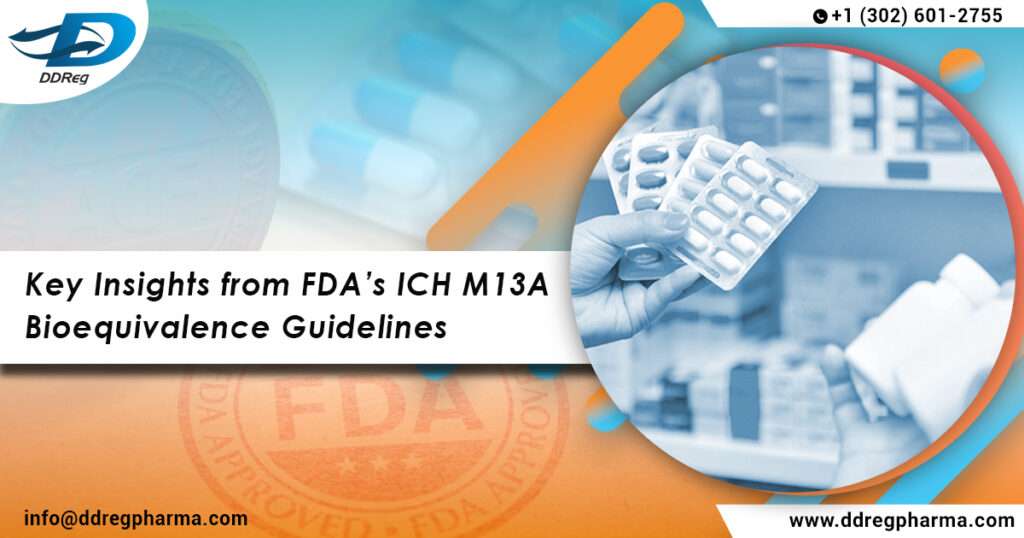Bioequivalence (BE) assessment is pivotal for determining the therapeutic equivalence of generic drug products to their respective reference-listed drugs (comparator products). The BE study should be conducted according to the guidelines set up by the U.S. Food and Drug Administration (FDA). One such guideline “M13A: Bioequivalence for Immediate-Release Solid Oral Dosage Forms” is a set of guidelines for establishing BE studies for solid oral dosage forms, focusing on study design, data analysis, and reporting. The guideline aims to harmonize BE studies across regulatory authorities and reduce redundant studies. Recently FDA has implemented the final guidance document including major changes from the draft and the FDA’s current BE guidance. The M13A guidance is expected to reduce the burden of testing in the pharmaceutical industry significantly.
What are the Key Changes in Final M13A Guidance?
The changes in the final M13A guidance for bioequivalence of immediate-release solid oral dosage forms include several updates aimed at streamlining the BE study process.
- Reduction in BE studies
- For non-high-risk products, the FDA is now recommending conducting only one BE study (either fasting or fed). A fasting study is preferred because of more sensitivity, and greater power to discriminate between pharmacokinetic profiles of the drug.
Minor changes made to the Product Specific Guidance (PSGs):
- The FDA has incorporated a BCS-based biowaiver option.
- Conducting a reference-scaled BE approach for highly variable drugs.
- Remove or add Risk Evaluation and Mitigation Strategies (REMS) for certain PSGs.
- For high-risk products, two BE studies (one under fasting conditions and another under fed conditions) are recommended because certain products may not be detectable through a single BE study due to differences in formulation or manufacturing process, leading to results from fasting BE studies not being predictive.
2. Revised Product Specific Guidance (PSGs)
The FDA has revised over 800 PSGs to align with the M13A guidance. These revisions focus on differentiating between high-risk and non-high-risk oral immediate-release products. This change aims to facilitate quicker approvals while ensuring safety and efficacy standards are met.
3. Revisions to Study Populations:
The final version mentions that BE should be conducted in “healthy subjects”, removing “General Population”, “Normal”, and “Healthy, General Population” terms.
The FDA also recommends using a single-sex study population when the drug is intended for use in one sex, such as oral contraceptives or treatments specific to female reproductive health. The language has been updated to “Healthy non-pregnant, non-lactating females” from “Healthy males and non-pregnant females, general population”.
Conclusion
The FDA’s final guidance M13A represents new trends in the BE study requirements that broaden the regulatory landscape. The key changes outlined in the guidance—such as reducing required studies, implementing a risk-based approach, and aligning with international standards—are poised to facilitate faster access to high-quality generic medicines and reduce the regulatory burden. As the pharmaceutical industry is evolving, M13A guidance will also serve as the basis for M13B (address biowaivers) and M13C (drugs with complex BE profiles) guidance. The FDA’s focus on efficiency and global harmonization is expected to reshape the way generic drug manufacturers approach bioequivalence studies, introducing innovative strategies to reduce the testing burden while maintaining rigorous safety standards.
In addition to providing regulatory and pharmacovigilance services for global customers, DDReg Pharma offers specialized clinical regulatory services to assist with Clinical Trial Applications in the United States. For further information, connect with our experts. Read more from the experts about Clinical Trial Information here: Center for Clinical Trial Innovation

